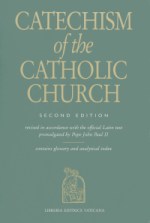Penance
Lesson 29 from the Baltimore Cathechism
379. What is the sacrament of Penance?
Penance is the sacrament by which sins committed after Baptism are forgiven through the absolution of the priest.
380. Whence has the priest the power to forgive sins?
The priest has the power to forgive sins from Jesus Christ, who said to His apostles and to their successors in the priesthood: "Receive the Holy Ghost; whose sins you shall forgive, they are forgiven them; and whose sins you shall retain, they are retained."
Receive the Holy Ghost; whose sins you shall forgive, they are forgiven them; and whose sins you shall retain, they are retained. (John 20:22-23)
381. With what words does the priest forgive sins?
The priest forgives sins with the words: "I absolve thee from thy sins in the name of the Father, and of the Son, and of the Holy Ghost. Amen."
382. What are the effects of the sacrament of Penance, worthily received?
The effects of the sacrament of Penance, worthily received, are:
- the restoration or increase of sanctifying grace;
- the forgiveness of sins;
- the remission of the eternal punishment, if necessary, and also of part, at least, of the temporal punishment, due to our sins;
- the help to avoid sin in future;
- the restoration of the merits of our good works if they have been lost by mortal sin.
383. What else does the sacrament of Penance do for us?
The sacrament of Penance also gives us the opportunity to receive spiritual advice and instruction from our confessor.
384. What must we do to receive the sacrament of Penance worthily?
To receive the sacrament of Penance worthily, we must:
- examine our conscience;
- be sorry for our sins;
- have the firm purpose of not sinning again;
- confess our sins to the priest;
- be willing to perform the penance the priest gives us.
But if the wicked do penance for all his sins which he hath committed and keep all my commandments and do judgment and justice, living he shall live, and shall not die. (Ezekiel 18:21)
385. What is an examination of conscience?
An examination of conscience is a sincere effort to call to mind all the sins we have committed since our last worthy confession.
386. What should we do before our examination of conscience?
Before our examination of conscience we should ask God's help to know our sins and to confess them with sincere sorrow.
387. How can we make a good examination of conscience?
We can make a good examination of conscience by calling to mind the commandments of God and of the Church, and the particular duties of our state of life, and by asking ourselves how we may have sinned with regard to them.
